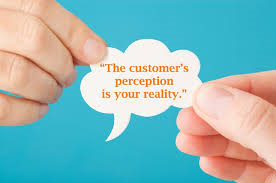
Even when a supplier continually delivers a high quality product or service (i.e. on time and to specifications) they often find that the customer doesn't perceive good value. Why?
Why does the value of a relationship as perceived by a supplier seldom match that of the customers' expectation?
 "The customer perception of the value they receive is reality ... no matter what we think!"
"The customer perception of the value they receive is reality ... no matter what we think!"
Case Study
Recently I came across an example where a supplier of services to a government instrumentality had asked their customer to benchmark their relationship.
They had completed 2 years of a 3 year contract. Over the two years they had met monthly with the customer to confirm that they were meeting the contracted statement of works and were achieving all the services levels - the customer had confirmed that they were with few discrepancies.
With twelve months remaining on the contract, the supplier conducted a relationship benchmark to ensure that the customer was delighted with the relationship and would be comfortable in renewing their contract.
They got a horrible surprise!
They discovered that the customer felt that they were not getting sufficient value from the relationship, despite excellent contractual delivery, and were planning to go to tender.
Considering the high level of service they were providing how could this be?
The reality is that most products and services are commodities. Most contracts call for the delivery of a commodity under certain terms and conditions and customers expect you to meet those terms as a minimum.
The Underlying Issue
The issue is that the [private] contract and the relationship are two different things. The contract is part of the relationship but is in itself not the relationship.
In this particular case when the relationship benchmark was completed the supplier learnt that the customer was happy with delivery but were markedly disappointed in two critical relationship measures:
- They felt that the supplier had not gained enough familiarity with the customers' business and had not aligned well to their organisation. The supplier had not invested enough resource and executive commitment into developing the relationship.
- The customer felt there was not enough innovation and value from the relationship and the supplier had not assisted them to keep up with competitive practices.
Though the supplier felt this was very unfair, perception is reality.
In response, the supplier asked the customer for some recommendations to address the issues raised. It turned out that these suggestions were relatively easily to address. They developed an action plan, shared it with their customer, implemented the plan and gave the customer progress reports.
Six months later they asked the customer to score the relationship again and while not perfect there was a marked improvement in perception of relationship value.
GOOD NEWS
The customer has since renewed the contract with the supplier for a further three years.
Managing perception via relationship benchmarking proved a valuable exercise for this supplier. They have now adopted the practice across their "blue chip" customers to enhance and grow their more important "one to one" relationships.
Perception is reality - so let's manage it.
**********

Your Invitation: I invite you to join the Sales Leader Forum group on LinkedIn where you can experience informative discussions with your peers and sales thought leaders on subjects like the one we have discussed here. I also invite you to subscribe to the
- Sales Leader Resource Centre here
- Sales Leader YouTube channel here (300+ sales leadership videos)
Please Share: If you valued this article, please share via your Twitter, LinkedIn, Google+ and Facebook social media platforms. I encourage you to join the conversation or ask questions. So feel free to add a comment on this post - I promise to respond. If inclined please follow my LinkedIn post page here.
Want to touch base? If you have questions please feel free to contact me - email: john.smibert(at)salesleaderforums.com, Phone: +61 404857893 or Skype: john.smibert